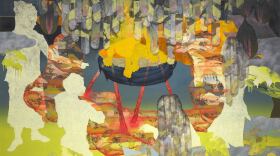Duke University researchers have new insight into why marine animals are eating plastic.
A research team studied coral from an estuary on the North Carolina coast, and found that they overwhelmingly preferred to ingest plastic particles -- whether straight from the factory or weathered for several years -- over plain sand.
The study, which can be viewed for free until December 10th, was co-authored by Austin Allen, a Ph.D. student at Duke's Nicholas School of Environment and Alex Seymour, a GIS analyst at Duke's Marine Robotics and Remote Sensing Center.
Seymour says the team was very surprised to find the coral also more often chose to eat unfouled weathered plastic over weathered plastic that had a microbial biofilm on it.
"The microbes are living organisms made up of nutritious substances, and many organisms eat microbes and their associated films. Plastic, on the other hand is not ever thought of as food, or as nutritious," Seymour explained.
He says that could mean the coral aren't just accidentally ingesting plastic, but may actually prefer it -- that it "tastes good."
What do they mean by it "tastes good"?
Seymour says the study's finding suggests that the chemistry of plastic, and potentially some of the additives from producing it are phagostimulants.
"And phagostimulants is just a fancy word for tasty chemistry," Seymour said.
Coral don't have taste buds exactly like other animals, but they do have chemoreceptors, which serve the same purpose of determining what is food, and what isn't.
"Corals are an interesting study species because they're not indiscriminate feeders," Seymour said, "They also don't have eyes, so they can't mistake things visually. They discriminate food through chemoreceptors that are analogous to taste buds."
What about other marine animals?
Researchers have long known that marine animals, including turtles and whales, sometimes eat plastic. Some animals have been found dead with plastic objects in their stomachs.
It is possible marine animals eat plastic by accident, because it looks like food, or because large animals like whales intake a lot of food at once indiscriminately.
Seymour says more research is needed to find a connection between the coral's preference for plastic and other marine animals' eating habits, and sees that as the next logical step in research.
If digesting plastic harmful, what can we do to stop animals from eating it?
In addition to the problems caused by animals eating large objects -- like plastic bags that can get stuck in an animal's stomach -- plastic can absorb toxins that could be harmful to animals. Plastic also contains additives that could be absorbed by animals after ingested. The coral in this study ingested and retained a small percentage of plastic for a full 24 hours, which raises concerns about the possible effects of keeping the plastic in its system.
Seymour says the good news that this study suggests, is that if it is true that marine animals are attracted to eating plastic because of its chemistry, maybe it could be manufactured to detract animals.
"If plastic can taste good, maybe it can also be made to taste repulsive," Seymour suggested.









